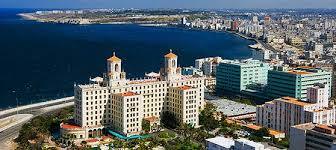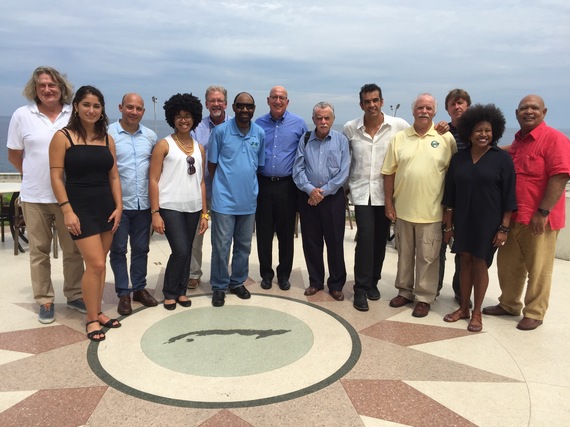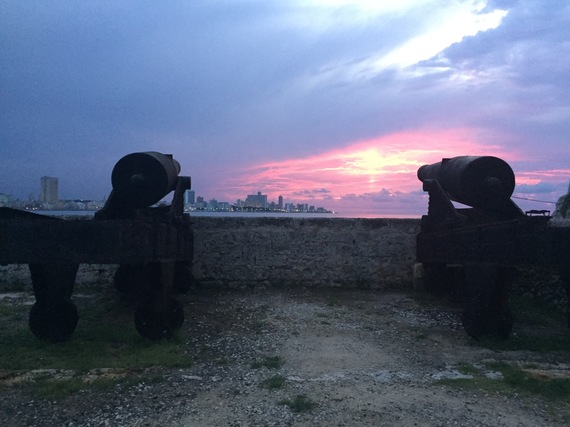This past week I had the opportunity to facilitate a Sustainable Tourism and Marine Science Symposium in Havana Cuba.
While many U.S. Citizens would not consider being a tourist in Cuba, as it is still not legal for U.S. Citizens to do so, it wasn't always that way.
The Hotel Nacionale
One such celebrity of visited this hotel as a tourist years ago was Walt Disney who stayed at the Hotel Nacional when he was suffering from stress, and his doctor advised a vacation.
We thought it fitting that we were holding our meeting on sustainable tourism at the very hotel resort that the founder of the Walt Disney Company, which is one of the most sustainable tourism companies in the world, stayed when he needed to renew his spirit and soul.
The hotel overlooks the Atlantic Ocean. I felt renewed every day just looking out the my 8th floor window at the water. My friend and colleague Wallace J. Nichols has documented in his book Blue Mind the healing power that water can bring to us all. It is no wonder that Walt Disney found such healing at this hotel with its fountain, views of the water, and tropical atmosphere.
Our meeting began with a wonderful cuban meal where we then gathered at the Cuba circle in the courtyard overlooking the sea for a group photo. The symbolism was perfect for Cuban and U.S. professors and scientists coming together to discuss the connection between sustainable tourism and coastal habitat and marine environments.
It was also symbolic that our four day program began on the U.N. World Tourism Day where we opened our meeting with a greeting from Cordula Wohlmuther, from the UNTWO in Madrid, Spain.
Our U.S. participants included 6 professors from the University of South Florida, a University of Florida county extension agent from the Florida Keys, the director of Cubamar from Miami, and two doctoral students.
Our Cuban counterparts included the Vice President of the International University Network, and professor University of Havana, a professor of geography and tourism from University of Havana, the Commodore of the Hemingway International Yacht Club, the Director of a climate change initiative, the vice Dean of the Environmental Faculty of InSTec and Scientific coordinator of Pro-Tortugas, director of the Cuban national aquarium.
Early on in our discussions for those from the States, it was easy to identify some of the key challenges that Cuba faced for sustainable tourism. Some of these challenges include the need for more infrastructure for accommodations, improved internet, customer service training, and management training to move increased numbers of people so as to have the least negative impacts.
Our cuban counterparts also reminded us of the need to increase food supply, protect the wonderful natural and cultural assets of the country, and perhaps most important to find ways to include the Cuban people in the benefits that tourism may bring the country.
As we listened to our Cuban counterparts we became aware that despite the many challenges that the Cuban tourism industry faces, they have much more to contribute as a model for sustainable tourism to the world than they may have need for improvement.
Some of the key models or lessons we learned from the Cubans re: sustainable tourism include but are not limited to the following.
- Since Castro came into power the forests in Cuba have actually increased 14%. One of the examples was the reforestation of the coffee plantation in Laz Terrazas which is a favorite for bird watching. The reforestation created a new ecotourism resort in what was a dying economy and given new life and hope to the people of the area. No one in our group could think of one country in the world that has actually increased its percentage of forests in the world in the past few decades.
As our meetings concluded with the ceremonial observance of the Cuban cannon for that goes off every night at 9:00 p.m. at the fort. it was as if the warning shot had been fired for all of us to take action in the battle to protect the planet.
Our group began to form partnerships and plans for next steps, perhaps the most important lesson for sustainable tourism for development was that each of our respective cultures have much to give and much to learn from each other. This will be a key to any plans for sustainable tourism development or redevelopment for the future.
Dr David W. Randle - Director USF Patel College of Global Sustainability Sustainable Tourism, Managing Director International Ocean Institute Waves of Change Blue Community Initiative, and President & CEO WHALE Center.
Follow David Randle on Twitter








